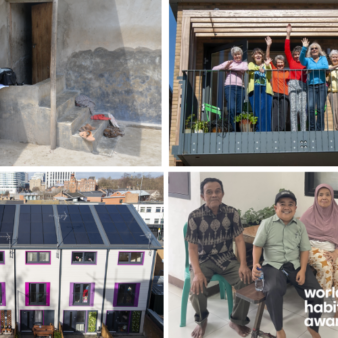
In 2016 there were over 200 million cases of malaria, from which almost half a million people died. However, malaria is preventable and curable. Today, on World Malaria Day, we hear from one of last year’s World Habitat Awards finalists – ARCHIVE Global in Cameroon – about their work to defeat malaria in an area where 4 in every 5 children were affected.
Building Malaria Prevention was a comprehensive, research-based anti-malarial housing project, working in the informal settlement of Minkoameyos, one of the poorest communities in the capital city of Yaounde, Cameroon.
In March 2012, ARCHIVE Global, Cameroon Coalition Against Malaria (MC-CCAM), National Malaria Control Program, and the University of Yaounde worked together to mosquito-proof and improve 264 houses for over 1,300 residents. The work was mostly straightforward – screening doors and windows; closing eaves and gaps in walls and roofs; and ensuring adequate ventilation, sewage, and draining solutions to halt exposure to malaria-carrying vectors and reduce the incidence of malaria.
We also trained around 5,000 local community members in construction and in the relationship between housing and health. In addition, a large-scale radio awareness campaign was broadcast that reached 55,000 listeners. At the end of the project, the exposure to malaria-carrying mosquitoes had halved.
From our inception in 2006, ARCHIVE Global has been driven by the simple yet powerful belief that access to adequate housing and health is a universal right. We have evolved from a research project – at Columbia University – to study the link between housing and health among people living with HIV/AIDS in South Africa. Now, we are internationally recognized for working at the unique intersection of health and architecture in vulnerable communities worldwide.
Our projects are multifaceted and require multidisciplinary engagement in order to ensure effective results. Not only do we combat disease through architecture, but through community training, education, and local engagement too – as in Yaounde. Malaria is an example of a preventable vector-borne disease that can be addressed through interventions in the built environment, and through community training and awareness.
While we focus mainly on vulnerable communities, we are aware that these are not exclusive to low and middle-income countries. For instance, we have worked in the London borough of Brent, where we completed a project alongside the National Health Service (NHS) using education and outreach as a means of combating tuberculosis (TB). After informing 30,000 people on the prevention, symptoms, and treatment of TB, there were one in five fewer reported cases after just 3 years.
Following our impact in Yaounde, we have widened our work on malaria prevention through partnerships with other organizations in West and Sub-Saharan Africa. For instance, in Swaziland and Namibia we are supporting their goals to be malaria-free by 2020.
Malaria can and does devastate entire communities, but – as our work in Cameroon has proved – we are able to provide comprehensive (and affordable) protection while training the community to show what can be done to eradicate this terrible disease.
Olivia Benjamin is Communications Officer and Jimi Patel is a Research/Grant Officer at ARCHIVE Global.




Join the discussion